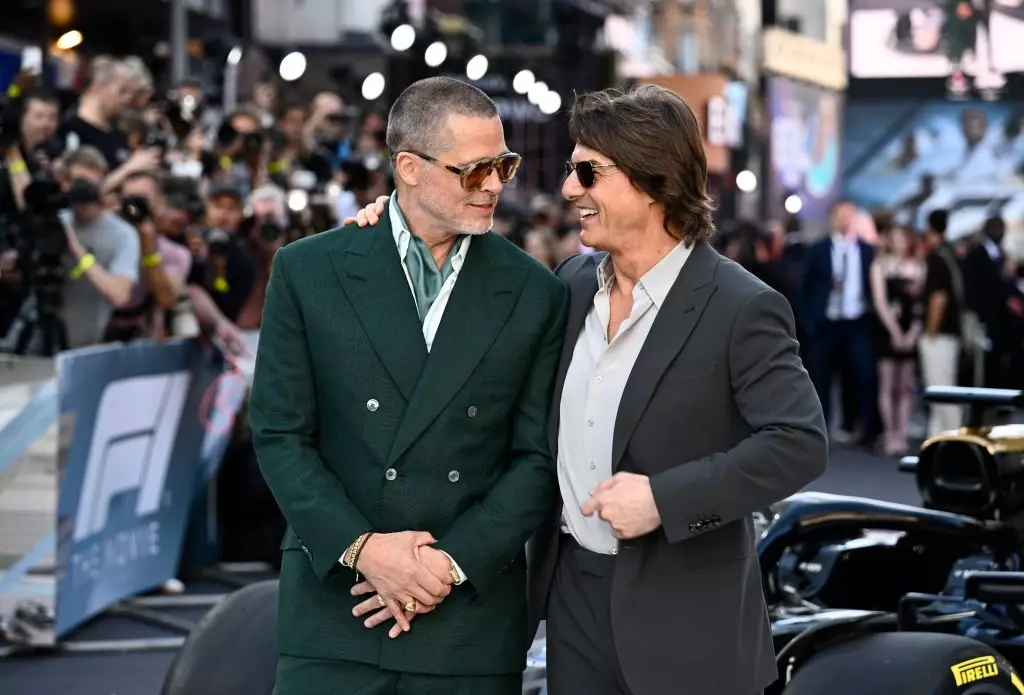Hollywood frequently sells the idea that its productions are born out of a genuine passion for the subject matter, especially when it comes to racing films. The story of Brad Pitt and Tom Cruise initially being attached to *Ford v Ferrari* exemplifies this narrative, suggesting a deep camaraderie and shared enthusiasm. Yet, behind the scenes, these projects often boil down to strategic decisions driven by studio interests, budget constraints, and star power rather than authentic storytelling. When Pitt explains that the project faltered because Cruise wanted to portray Shelby — a character who arguably holds less driving significance — it exposes the superficiality embedded in Hollywood’s portrayal of passion. Their negotiation reveals that even the most seemingly passionate collaborations are often marred by competing ego interests and studio politics rather than a genuine love for the racing world.
Studio Economics: The Real Fuel Behind Film Failures
The failure of the original *Ford v Ferrari* project wasn’t rooted in creative differences alone; rather, it was ultimately dictated by economic realities. Joseph Kosinski’s remark about studio objections over budget underscores a harsh truth — Hollywood’s pursuit of spectacle and profit often trumps authenticity or storytelling integrity. The industry’s obsession with spectacle at the expense of narrative substance turns passionate projects into costly gambles. It also explains why so many racing films, despite their visceral appeal, struggle to become more than box office experiments. When financial considerations take precedence over craft, films become commodities rather than genuine artistic endeavors. This economic pragmatism saps the storytelling of depth and reduces these movies to superficial thrill rides designed primarily to generate profit.
The Myth of Sequel-Driven Authenticity
The touted possibility of a *Ford v Ferrari* sequel echoes the industry’s tendency to exploit successful formulas regardless of their original vision. Kosinski’s claim that “it’s up to the audience” whether a sequel proceeds exemplifies Hollywood’s cynical stance — sequels are less about storytelling continuity and more about capitalizing on brand recognition. Pitt’s expressed desire to drive again and revisit racing stories feels more like strategic radio silence meant to keep audiences hooked, rather than genuine enthusiasm. This approach reduces complex characters and racing histories into commodities, transforming passion into marketable franchise assets. The result is a cycle of recycled narratives that claim to be “authentic,” but are ultimately driven by the need for repeated box office successes rather than honest storytelling.
The Truth About Hollywood’s Racing Obsession
At its core, Hollywood’s fascination with racing is often superficial, leaping on the adrenaline rush and spectacle rather than engaging with the sport’s essence. Films like *Ford v Ferrari* and the upcoming F1-focused drama serve as elaborate spectacles that oversimplify or romanticize racing’s complexity. Pitt’s musings about a sequel focusing on youthful rivals versus seasoned veterans highlight Hollywood’s tendency to commercialize conflict—reducing racing stories to battles of ego rather than nuanced explorations of human ambition and resilience. While genuine fans might crave authenticity, the truth is that Hollywood prefers to package these stories as digestible, commercially viable archetypes. This obsession with storytelling as spectacle results in a disconnect from the real grit and depth of racing culture, which is ultimately sacrificed for box office appeal.
The False Promise of Innovation in Hollywood Racing Films
Despite claims of pushing boundaries through innovative filmmaking, the reality is that Hollywood’s approach remains fundamentally conservative. Films about racing are often afraid to stray too far from familiar formulas, fearing that deviation might alienate audiences or threaten their commercial viability. Kosinski’s insight about the *Ford v Ferrari* project falling apart over budget concerns—a point he made in interviews—underscores that even ambitious projects are hamstrung by budget constraints and risk aversion. When Hollywood plays it safe, the innovative potential of sports storytelling is stifled, relegating films to predictable narratives that prioritize spectacle over substance. The industry’s focus on winning at the box office often prevents genuine innovation, turning racing into a backdrop for superficial hero stories rather than a lens through which to explore broader human themes.
Ultimately, Hollywood’s portrayal of racing reflects a broader tendency to commodify passion while masking the underlying profit motives. Despite occasional glimpses of authenticity, the industry’s racing films often serve as elaborate illusions rather than sincere celebrations of motorsport. The genuine human stories behind racing — perseverance, innovation, tragedy, and triumph — remain overshadowed by the relentless pursuit of spectacle and profit, revealing a cynical bias that prioritizes entertainment over truth.

